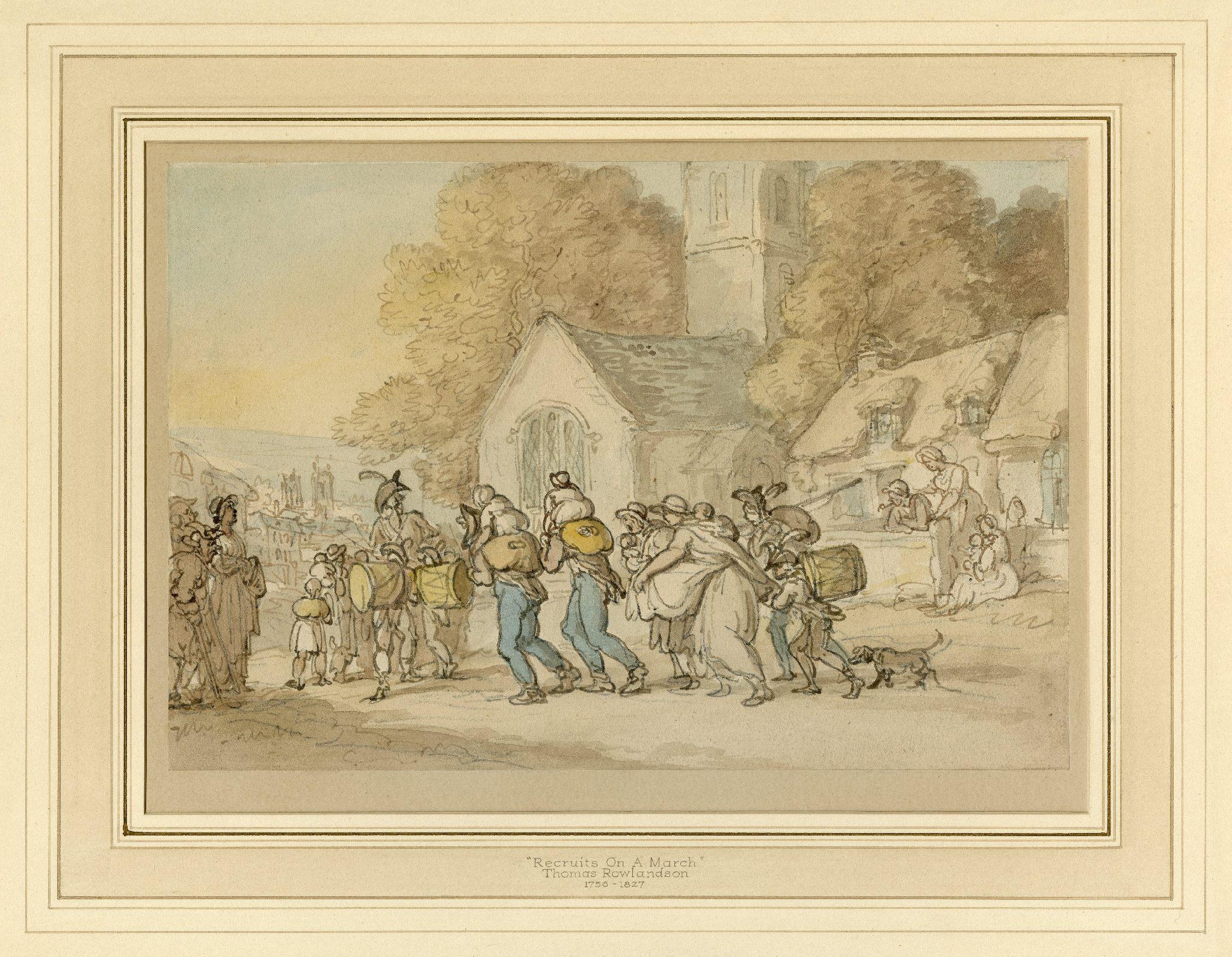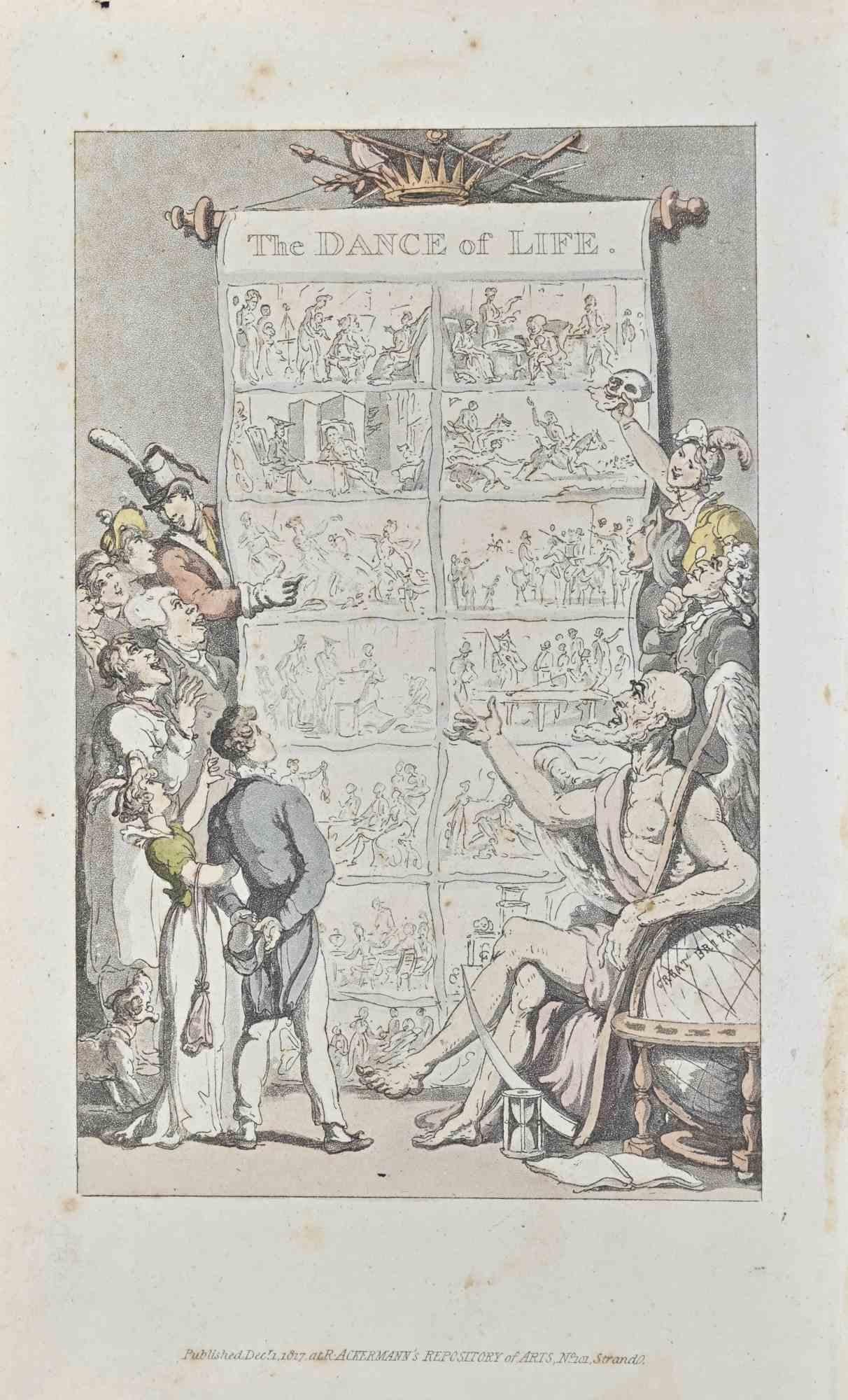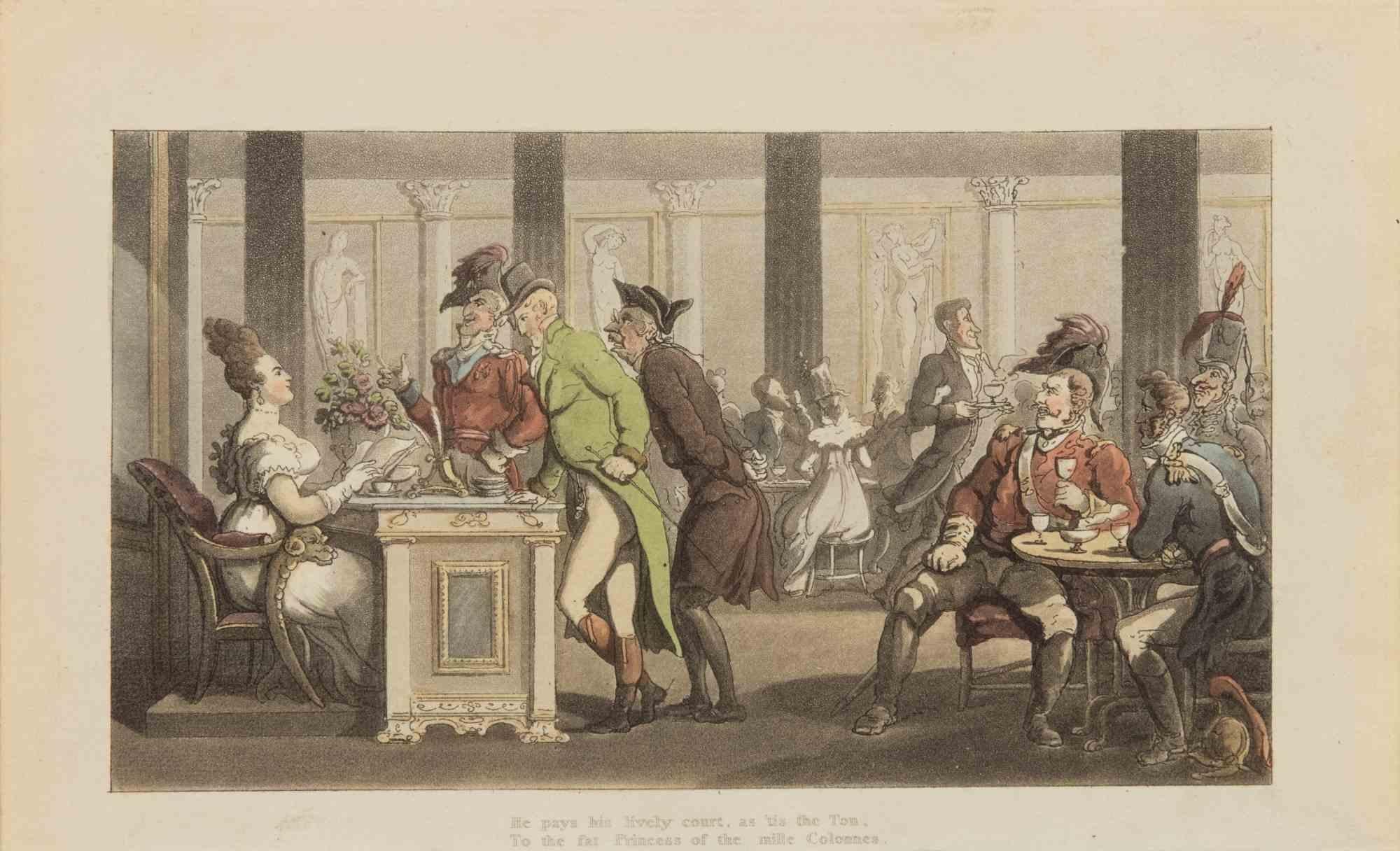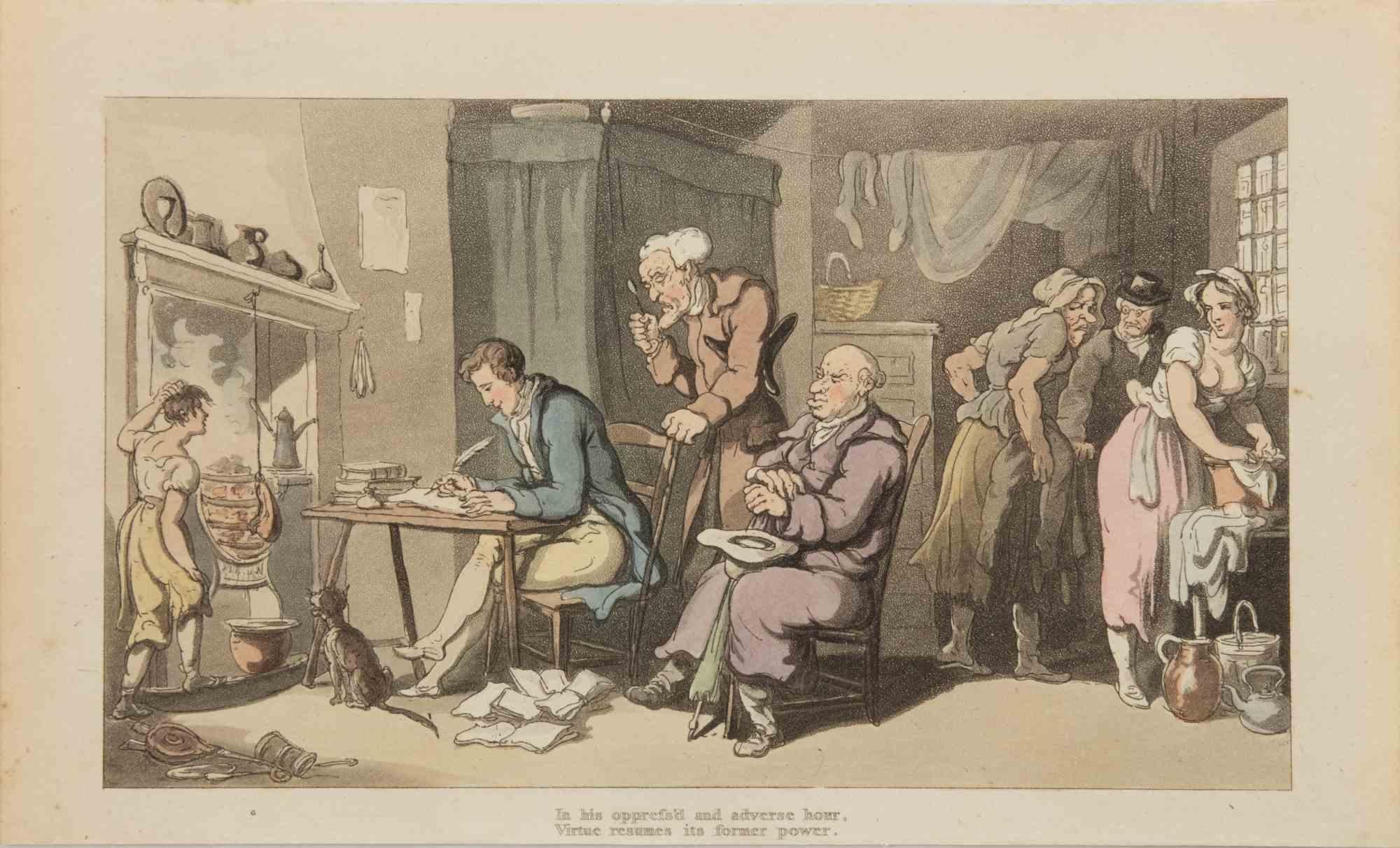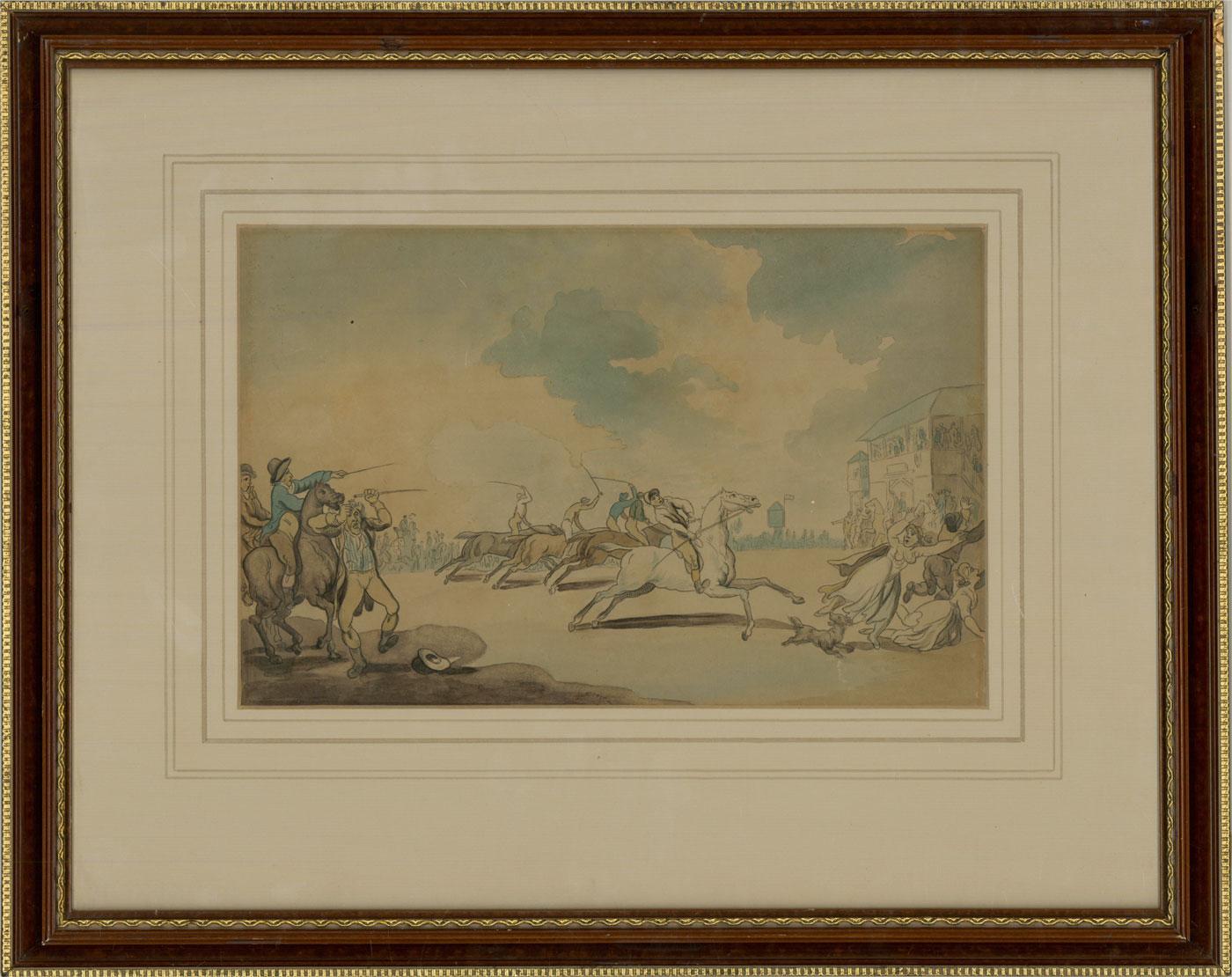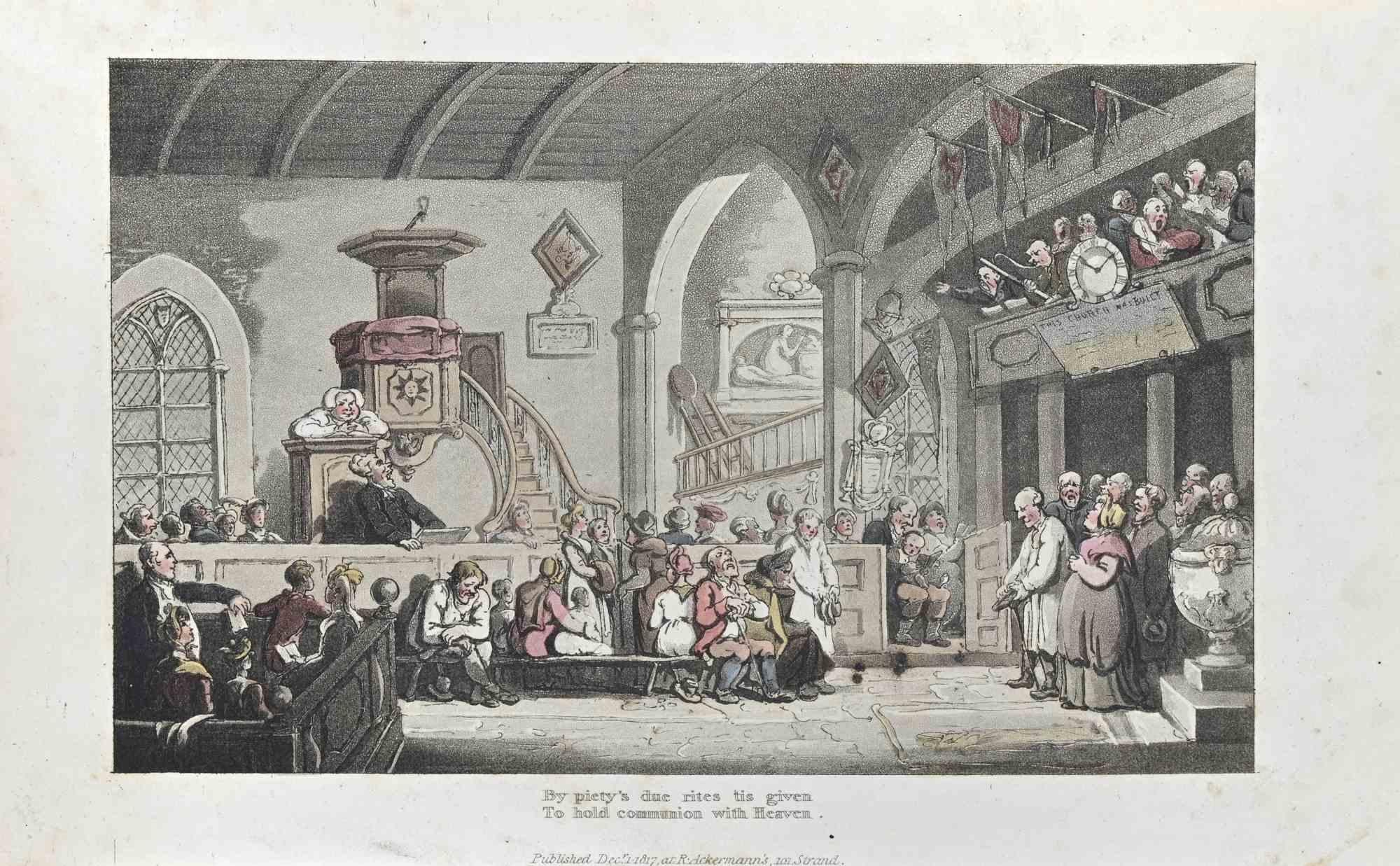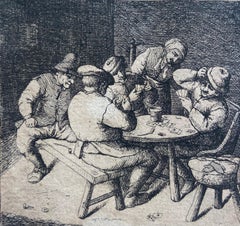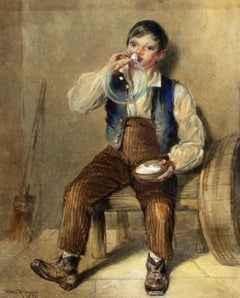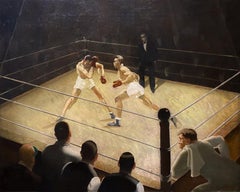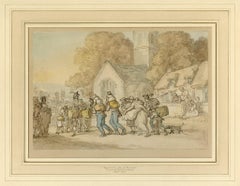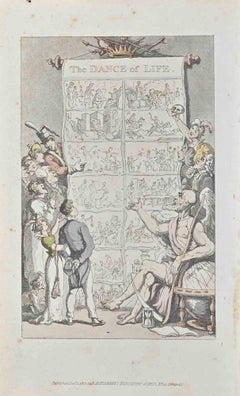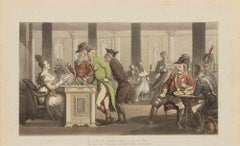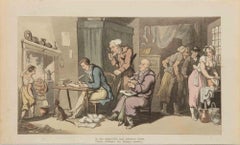Items Similar to The Boxing Match
Want more images or videos?
Request additional images or videos from the seller
1 of 6
Thomas RowlandsonThe Boxing Match
$8,042.38
£6,000
€6,972.75
CA$11,268.07
A$12,271.78
CHF 6,470.48
MX$149,260.21
NOK 81,366.01
SEK 76,314.67
DKK 52,067.53
About the Item
Pencil, pen and ink and watercolour on laid paper
Image size: 12 ¾ x 16 inches (33 x 40.5 cm)
Wash mount and period frame
Boxing was a subject that Rowlandson depicted on a number of occasions in his prints and watercolours. The sport enjoyed an unprecedented surge in popularity during the Regency period when it was openly patronised by the Prince Regent and his brothers. Championship boxing matches acquired a louche reputation as the places to be seen by the wealthy upper classes. A match would often be attended by thousands of people, as depicted by the crowd of spectators in this watercolour, many of whom had wagered money on the outcome.
Further examples of Rowlandson's boxing subjects dating to a similar period as the present lot include a watercolour in the Mellon Collection dating from 1787 and a slight sketch of a boxing match by him in the collection of the British Museum, dated 1785-90.
Thomas Rowlandson was a draughtsman and printmaker whose distinctive social satire has become integral to the popular vision of late Georgian Britain.
Rowlandson was born in London in 1757 and educated at Dr Barwis’ school on Soho Square before attending the Royal Academy Schools from the age of fifteen. Rowlandson lived in the centre of London throughout his life, although he made several trips to continental Europe. Unusually for a Royal Academy student, Rowlandson seems never to have worked in oils, gravitating instead towards producing sketches and etchings for the print trade.
The Artist
Rowlandson began by making scabrous satires in the vein of his close friend and contemporary James Gillray, often on subjects such as the politicians William Pitt and Charles James Fox, the misdemeanours of the young prince of Wales (and future George IV), and events in post-revolutionary France. Unlike Gillray, however, he was equally adept making lyrical drawings and watercolours on a range of subjects, from imitations of Old Master paintings to picturesque landscapes.
Rowlandson worked for many print publishers but his most important employer was Rudolph Ackermann, who kept Rowlandson in almost continual employment from 1798 onwards, making drawings for a wide range of books that exploited Rowlandson’s range for lyrical topography and gentle caricature.
Rowlandson’s drawings and watercolours were also collected by many wealthy patrons. Rowlandson was healthy and industrious up until the last two years of his life. He died in 1827 and was buried in the church of St Paul’s, Covent Garden. Rowlandson’s work was neglected during the conservative Victorian period but since the 20th century he has been reappraised as one of the greatest of British graphic artists.
- Creator:Thomas Rowlandson (1756 - 1827, British)
- Dimensions:Height: 12.75 in (32.39 cm)Width: 16 in (40.64 cm)
- More Editions & Sizes:1 of 1 Price: $8,042
- Medium:
- Period:
- Condition:
- Gallery Location:London, GB
- Reference Number:1stDibs: LU52412614762
About the Seller
5.0
Gold Seller
Premium sellers maintaining a 4.3+ rating and 24-hour response times
Established in 2007
1stDibs seller since 2014
85 sales on 1stDibs
Typical response time: 3 hours
- ShippingRetrieving quote...Shipping from: London, United Kingdom
- Return Policy
Authenticity Guarantee
In the unlikely event there’s an issue with an item’s authenticity, contact us within 1 year for a full refund. DetailsMoney-Back Guarantee
If your item is not as described, is damaged in transit, or does not arrive, contact us within 7 days for a full refund. Details24-Hour Cancellation
You have a 24-hour grace period in which to reconsider your purchase, with no questions asked.Vetted Professional Sellers
Our world-class sellers must adhere to strict standards for service and quality, maintaining the integrity of our listings.Price-Match Guarantee
If you find that a seller listed the same item for a lower price elsewhere, we’ll match it.Trusted Global Delivery
Our best-in-class carrier network provides specialized shipping options worldwide, including custom delivery.More From This Seller
View AllThe Card Players, Late 18th Century British Etching
Located in London, GB
Etching laid on paper
Image size: 3 1/4 x 3 1/4 inches (8 x 8 cm)
This etching is after a work by Adriaen van Ostade, a 17th century Dutch artist.
This wonderful etching shows a gr...
Category
Late 18th Century Interior Prints
Materials
Etching
The Experiment, Dated 1838, Signed English Watercolour
By Alfred H. Taylor
Located in London, GB
Alfred H. Taylor
The Experiment
Watercolour, signed and dated 1838
Image size: 9 ½ x 8 inches
Category
19th Century Victorian Figurative Drawings and Watercolors
Materials
Watercolor
A Boxing Tournament RA Artist, British Oil, Major Sporting Event
By Anna Katrina Zinkeisen
Located in London, GB
Anna Zinkeisen
1901-1976
A Boxing Tournment
Oil on canvas, signed lower right
Image size: 29 x 36.5 inches (73 x 93 cm)
Original hand made frame
A Boxing Tournament is a vivid and impactful snapshot of a professional boxing match from the late 1920s/1930s. It depicts the Len Harvey vs. ‘Kid’ Nitram fight held at the Royal Albert Hall on 19th January 1928, which Zinkeisen went to watch.
The umpire of this match was the well-known Sam Russell. Here, Russell is seen wearing a dinner jacket as well as a shirt - an indication that this was a match in a professional tournament.
Both Len Harvey and 'Kid' Nitram were esteemed boxers. Harvey boxed at every weight division available at the time, from flyweight to heavyweight and became the light-heavyweight and heavyweight champion of the British Empire. During the Second World War Harvey joined the Royal Air Force as an officer.
Anna enjoyed noticeable publicity from the painting at the time. She appeared in photographs, alongside her sketches for the painting, in numerous newspapers including The Daily Mail (31st January 1928) and The Sketch (8th February 1928).
This painting is featured in Highly Desirable: The Zinkeisen Sisters & Their Legacy by Philip Kellaway, page 178 (Leiston Press, 2008).
The Artist
Anna Zinkeisen was born at Kilcreggan, Dumbartonshire on 29 August 1901, the daughter of Victor Zinkeisen, a timber merchant, and his wife Clare.
In 1901 the family moved to Middlesex. Anna and her sister Doris attended Harrow School of Art before they both won scholarships to the Royal Academy Schools, where Anna studied sculpture from 1916-1921, winning several medals. She received a commission for some plaques from the Wedgwood company and although her designs were awarded a silver medal at the Exposition des Art Decoratifs in Paris in 1925, she decided to specialise in portrait painting and mural work.
In 1935, Anna and her sister Doris Zinkeisen were commissioned by John Brown & Co. (Shipbuilders of Clydebank) to paint the murals in the Verandah Grill of the famous ocean liner the RMS Queen Mary. Their work can still be seen on the ship, now permanently moored in Long Beach, California. They also painted murals for the Queen Elizabeth.
In 1941, during World War II, the Zinkeisen sisters were both employed as war artists for the North West Europe Commission of the Joint War Organisation of the British Red Cross Society and the Order of St John...
Category
20th Century Figurative Paintings
Materials
Canvas, Oil
Three Men Without Their Boat, Signed 20th Century French Illustration
Located in London, GB
Watercolour and ink on paper, signed bottom right
Image size: 7 x 10 1/2 inches (17.75 x 26.5 cm)
Gilt frame
An original artwork by an early 20th Century French illustrator, this is...
Category
Early 20th Century French School Figurative Drawings and Watercolors
Materials
Paper, Ink, Watercolor
Infighting, Ink Sketch, 20th Century British Artist, Framed
By Samuel Rabin
Located in London, GB
Ink on lined paper
Image size: 3 x 2 3/4 inches (8 x 7 cm)
Hand made frame
Sam Rabin
Samuel (Sam) Rabin, originally Samuel Rabinovitch, was an English sculptor, artist, teacher, singer, wrestler and Olympic bronze medallist. Rabin, who was Jewish, was born Samuel Rabinovitch on 20 June 1903 at Dewhurst Street, Cheetham, North Manchester. His parents were both Russian Jewish exiles from Vitebsk (now in Belarus).
During his childhood, the family moved to Salford where Rabin grew up and where his parents encouraged his talent for drawing. In 1914 Rabin won a scholarship to the Manchester Municipal School of Art making him, at the age of 11, the youngest pupil ever to attend the college. There he was taught drawing by French artist Adolphe Valette. In 1921 he moved to the Slade School of Fine Art in London where he continued his studies under Henry Tonks until 1924. After the Slade, Rabin studied in Paris where he met and was greatly impressed and influenced by sculptor Charles Despiau.
Rabin's own sculpture from this time is little known as he was a perfectionist and destroyed work that he considered unsatisfactory. In 1928, working under his full surname, he was commissioned by architect Charles Holden to carve West Wind, one of eight personifications of the four winds for the headquarters of the Underground Electric Railways Company of London at 55 Broadway. The sculpture was partly completed in-situ on the building. In 1930, he produced his only other public sculptures; two decorative winged masks, The Past and The Future, for the Daily Telegraph building in Fleet Street. These were carved on the building directly from the scaffold.
Both commissions were well received at the time, but Rabin was unable to make a living as a sculptor and turned to another career – wrestling, for which he abbreviated his surname. Rabin was physically strong and had boxed and wrestled as an amateur to fund his art. He won a bronze medal in the middleweight division of the free-style wrestling at the 1928 Olympics in Amsterdam. Rabin turned professional in 1932 and fought as Rabin the Cat and Sam Radnor the Heb. Alexander Korda cast him as a wrestler in The Private Life of Henry VIII in 1933 and as Mendoza, a Jewish prize-fighter, in The Scarlet Pimpernel in 1934. Despite lacking any formal musical training, Rabin was a talented baritone and worked professionally during the 1940s singing with Stars in Battledress and sang operatic arias with the army's Classical Music Group. In 1946 he auditioned for La Scala's conductor, Victor de Sabata.
In 1949, Rabin began teaching drawing at Goldsmith's College of Art in New Cross, London. His disciplined teaching style including the production of demonstration works, followed that of his own teacher, Valette. His students included Mary Quant, Bridget Riley and Tom Keating...
Category
Mid-20th Century Figurative Drawings and Watercolors
Materials
Paper, Ink
A View of Riseholme, 18th Century English Signed Watercolour Landscape
Located in London, GB
Watercolour on paper, signed and entitled bottom right
Image size: 12 x 10 inches (30.5 x 25.5 cm)
Category
18th Century Landscape Drawings and Watercolors
Materials
Paper, Watercolor
You May Also Like
Recruits on a March
By Thomas Rowlandson
Located in Fairlawn, OH
Recruits on a March
Ink and watercolor on paper, mounted on support
Unsigned
Condition: watercolor sheet laid down on paper, moderately faded
Original Ackermann frame and matting
Ima...
Category
Early 1800s Romantic Figurative Drawings and Watercolors
Materials
Watercolor
The Dance of Life - Frontispiece r - Etching by Thomas Rowlandson - 1817
By Thomas Rowlandson
Located in Roma, IT
Etching and aquatint realized by Thomas Rowlandson in 1817. Plate from "The Dance of Life" by William Combe.
Very good condition.
Thomas Rowlandson (1757-1827) was an english artis...
Category
Mid-19th Century Modern Figurative Prints
Materials
Etching
He Pays his Lively Court - Etching by Thomas Rowlandson - 1817
By Thomas Rowlandson
Located in Roma, IT
Etching and aquatint realized by Thomas Rowlandson in 1817. Plate from "The Dance of Life" by William Combe.
Very good condition.
Thomas Rowlandson (1757-1827) was an english artis...
Category
Mid-19th Century Modern Figurative Prints
Materials
Etching
In His Opprefs'd and Adverse Hour- Etching by Thomas Rowlandson - 1817
By Thomas Rowlandson
Located in Roma, IT
Etching and aquatint realized by Thomas Rowlandson in 1817. Plate from "The Dance of Life" by William Combe.
Very good condition.
Thomas Rowlandson (1757-1827) was an english artis...
Category
Mid-19th Century Modern Figurative Prints
Materials
Etching
Atrrib. Thomas Rowlandson (1757–1827) - c. 1798 Watercolour, The Start
Located in Corsham, GB
A humorous late Georgian cartoon, showing the chaotic start to a horse race as one of the horses goes out of control and runs into the spectators, sending them fleeing. The scene app...
Category
18th Century Figurative Drawings and Watercolors
Materials
Watercolor
By Piety's Due Rites tis Given - Etching by Thomas Rowlandson - 1817
By Thomas Rowlandson
Located in Roma, IT
Etching and aquatint realized by Thomas Rowlandson in 1817. Plate from "The Dance of Life" by William Combe.
Very good condition.
Thomas Rowlandson (1757-1827) was an english artis...
Category
Mid-19th Century Modern Figurative Prints
Materials
Etching
More Ways To Browse
Antique Matches
Boxing Art
Prince Regent
Boxing Painting
Rudolph Ackermann
18th Century Pen And Ink
18th Century French Gardens Art
African American Art Watercolors
Amate Paper
Anais Nin
Vintage Cabaret Dancers
Drawings Of Couples
Jean Paul Le Verrier
Skull Drawing
Charles Guerin
Rabbi Drawing
Utamaro Woodblock Prints
Dog Pencil Drawing
